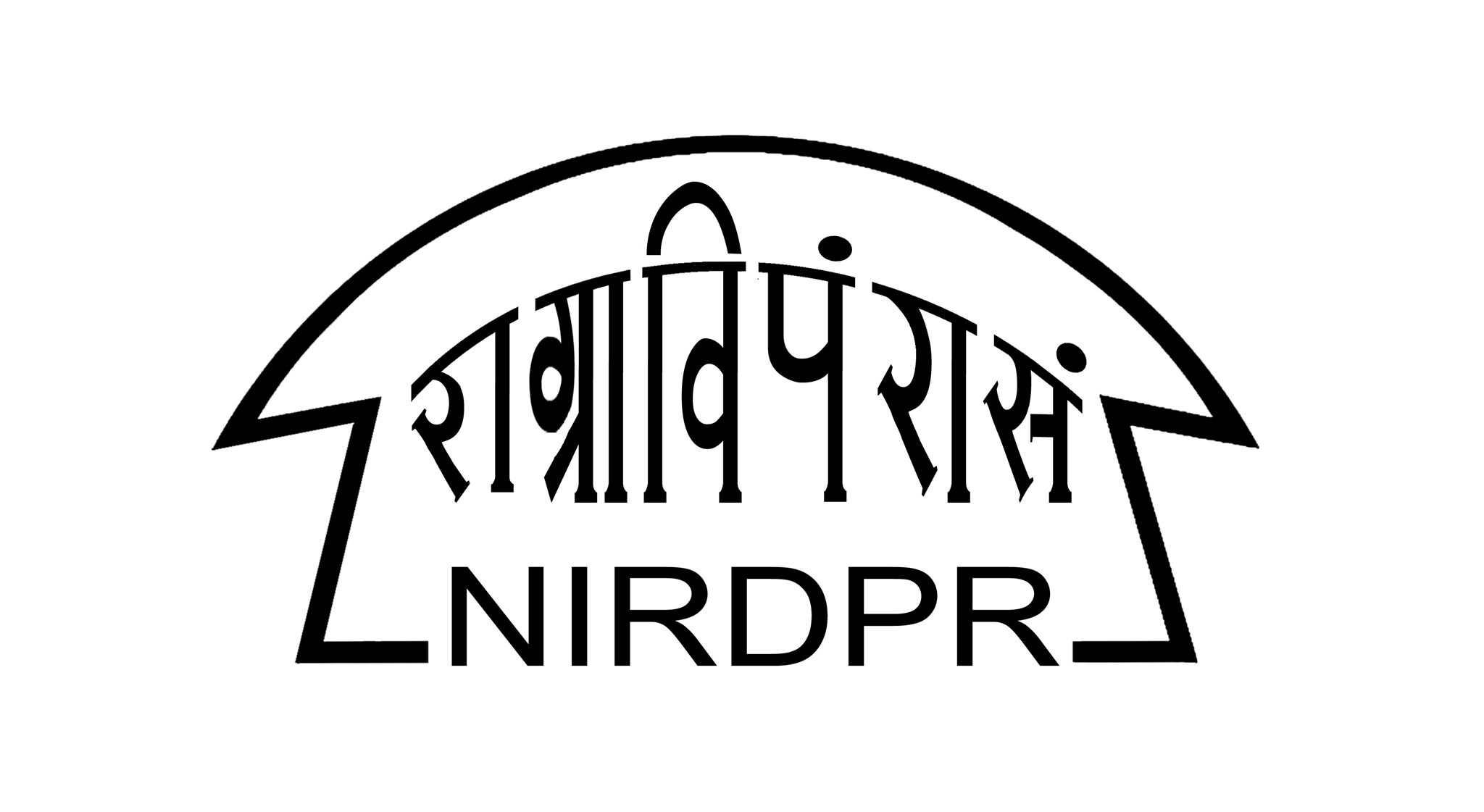
CONTENTS:
GENDER KALEIDOSCOPE: Redesigning Conditional Cash Transfer Interventions for Better Development Outcomes of Women and Children
3rd Meeting of Policy Research Advisory Committee (PRAC) Held at NIRDPR
Entrepreneurship Training for Armed Force Personnel at Rural Technology Park, NIRDPR
National Training on SEED Livelihood Component
ToT on Scope and Relevance of Convergence of Schemes with Watershed Activities for Maximizing Investment
CDC, NIRDPR Organises Library Talk on Constitution of India and Foreign Policy
Training Programme on Leadership Skills for Rural Development Professionals
Capacity Building Program on Skill Development for KVIC Officials
NRLM CASE STUDY SERIES: Naari Xurakhya Kokh (NXK): An Initiative by Assam SRLM towards Gender Sensitive Society
Training Programme on Strengthening Primary Healthcare with a Focus on LSDG Theme 2: Healthy Village
Empowering Rural India: Three-Day Training on Mahatma Gandhi NREGS
Desh ka Prakriti Parikshan Abhiyan: NIRDPR Organises Lecture on Hack for Healthy Living
NIRDPR Conducts Training on e-Office for Staff for Enhanced Efficiency
Mahaparinirvan Diwas 2024 Observed at NIRDPR
Library Talk Marks World Soil Day at NIRDPR: A Focus on Healthy Soil and Climate Resilience
NIRDPR Faculty Wins Best Research Paper Award at IMRC 2024
Redesigning Conditional Cash Transfer Interventions for Better Development Outcomes of Women and Children
Dr Vanishree Joseph
Head, Centre for Gender Studies and Development, NIRDPR
Conditional Cash Transfer (CCT) programmes in Africa, Asia, and Latin America are designed to address two issues: One is to bring change to the existing social practice, and another is to minimize the government’s expenditure. Attention is paid to family welfare and human capital formation in most of the CCT programmes. The existing CCT programmes aim to improve the health, nutrition, and education of women and children within the household, and the money is transferred to women in most of the policies. Along with the money, women take up the conditionality imposed on them. Mothers are given more responsibility in forming the human capital of their children. This implies women’s greater role and commitment towards children and their own social security (Joseph, 2016).

These policies have indeed provided women with access to social pensions, cash transfers, and child-related benefits than ever before. However, the discourse has never addressed the discriminatory practices of gender inequality, and still, the problem of declining child sex ratio and undernourishment of women and children persists. Policy discourse of such nature will reinforce care responsibility and confine women to domestic work. Receiving a monetary transfer alone does not automatically give women receivers more power. Although women are the official recipients of cash transfers, deciding how to spend it may depend on gender-based power relations in the household (Hagen-Zanker et al., 2017). The control over resources and decision-making process are at the disposal of patriarchy.
A conditional cash transfer programme would demand additional decisions from the household for them to get the benefit (Banerjee et al., 2022). Who makes the household decisions and who follows the condition determine the power relationship within the household. The intended spillover effect will not reach other households in such a case. The fringe benefit from Government intervention through CCT will not change the existing gender disparity.
The emphasis of CCT is the continuation of past Women in Development (WID) strategies that aimed to “integrate” women into development without addressing the root cause of gender inequality (Molyneux, 2007). Women are increasingly taking on more responsibility and obligation to deal with children and human capital formation, and they have fewer options as a result. This phenomenon is known as the feminization of responsibility and obligation.
In general, policymakers, academics, and researchers agree that women typically use all of their income to improve household circumstances like children’s education, health, nutrition, and marriage. Men frequently keep money from the household for personal use, which puts women and children who depend on that income in a secondary poverty situation (World Bank, 2014). Giving resources to women through Government programmes is intended to do away with men squandering the resources given to them and to make sure they reach the intended recipients and activities. But in the end, it falls short of addressing the underlying causes of inequality and poverty.
The impact evaluation of CCT programmes focused on the quantitative first-order outcome but not on the change in attitudes towards girl children or women’s health. More generally, impact evaluations should simultaneously quantify all pertinent effects on every household member to determine whether CCT programs that have women’s empowerment as an objective may trade off other results. To quantify the net gains of all possible beneficiaries, targeted impacts and spillover effects should be more thoroughly examined. Impact analyses very infrequently consider this (World Bank, 2014).
There is also evidence that CCT users encounter abuse and prejudice when they interact with service providers, particularly because of their socioeconomic status, religion, ethnicity, and language. Women who can complete the requirements may feel proud that they have earned the benefit, but those who cannot may feel ashamed (Arriaga, 2018). Studies on CCTs have revealed a significant rise in educational attainment and a persistent decline in the overall birth rate, but they did not improve health, labour market results, or empowerment (Baird, McIntosh, and Ozler, 2016).
The emphasis on apprehending the economic rents of CCT may provide low-quality health and education outcomes. Moreover, studies have demonstrated that women in rural areas and those without formal education benefit disproportionately (Joshi and Sivaram, 2014). If this were the case, the motivation to honour girls and women would be lost because the family would no longer receive financial support. Potential consequences of CCTs should not only focus on economic interest but also on social norms and their role.
Hence, there is a need to relook into the CCT programmes on the premise of how intrinsic changes will happen in addressing the issue of gender stereotypes and benefiting women and children in development outcomes. This policy brief is an attempt to address these challenges.
Form of transfer and household benefit
The complexity of women’s experiences, which are intensified by various kinds of discrimination, should be acknowledged and addressed through well-designed and executed social protection. To combat the intergenerational transmission of poverty, well-designed social protection systems can lower these risks by Delivering regular, adequate cash transfers and services to households with young children and adolescents, granting girls and women of reproductive age, including pregnant women, girls and new mothers, access to necessary protections; supporting shared responsibility for caring and offering paid parental leave; extending the availability of social safety benefits and high-quality public services to all women, especially those who work in informal, low-paying, and precarious jobs, throughout their working lives and into old age (SPIAC-B, 2019).
Some of the most important factors influencing a child’s health are their mother’s knowledge and education, which will improve the nutritional status, cleanliness habits, and willingness to seek medical attention when they are ill (Rasella et al., 2013). They can’t be supplied exclusively with money. It is unjustified to anticipate that CCTs will be able to resolve every issue. Yet, it will be crucial for these initiatives to strike a balance between the competing goals of eliminating severe poverty and enhancing both women’s and children’s health (Fernald et al., 2009; Fernald, 2013).
Gender-segregated data
The term “gender data” is frequently used to refer to sex-disaggregated statistics, and requests for the collection of gender data typically leave out certain types of qualitative evidence. Numbers only tell partial evidence. The gender data movement must go beyond technical indicators and raise difficult concerns about identity, power, wealth, and justice to change the unfair conditions of our world. Women’s accounts of their own lives must be included in gender data (Tara Patricia, book).
If mothers receive a monetary transfer and improvements to health services, their likelihood of visiting clinics will increase. Data on gendered obstacles to service delivery, including qualitative data and sex-disaggregated time-use surveys, must be collected and used in order to make these improvements. Political will is needed to make these design choices and resource allocations so that women can thrive outside and within households (Kachwaha et al., 2019).
Data disaggregation by locality and sex is on the rise, but there is room for improvement, particularly in the consistent use of gender outcomes in monitoring and evaluation. To create inclusive programming, disaggregation by age and disability must be addressed because it is not common.
Account women’s care work
The conditionalities of CCTs reinforce the care work of women, which is for social good. Even though it promulgates progress in development, care work is done free of cost and considered a female responsibility. This promulgation of the gendered division of labour will have an intense effect on the daily lives of women and girl children. The time and energy spent by women on care work limit their role in social, economic, and political life and perpetuate poverty and inequality (Chopra Caroline, 2015).
In India, the value of women’s unpaid work amounts to 3.1% of the GDP. On the other hand, the nation invests less than 1% of its GDP on infrastructure related to care, such as early childhood education, child care centres, and maternity and disability benefits. So, the key tactics should be investing in the care economy and recognizing women’s and girls’ unpaid care work (Mitali, 2022). Redistribution of domestic work should be informed and made possible through policy decisions.
The extra responsibility that women and girls bear for childcare, homeschooling, and caring for sick family members in the pandemic and post-pandemic periods is also one of the key distinguishing characteristics that contribute to inequality. To establish egalitarian care systems and norms in a post-pandemic world, transformative social protection policies must recognise, reduce, and redistribute care work within families (Gavrilovic et al., 2022).
Breaking the stereotype
If CCTs should be used to strengthen human capital, policymakers should purposefully create them in a way that doesn’t support stereotypes and prejudice against women or jeopardise their ability to exercise their basic rights. Women are more likely than men to rely on social services because of their responsibilities in childrearing and providing care. Therefore, the potential advantages of transfers will be undermined, and conditionality fulfilment will be more challenging if social services remain indifferent to women’s unique needs and vulnerabilities and if financial barriers like service fees for health and education remain in place. Hence, gender-sensitive social services, including health, water, sanitation, and care services, must be provided in addition to conditional cash transfers (UNRISD, 2016).
The burden of conditions
Even in unfavourable situations in countries with weak economic bases, large debt burdens, limited fiscal flexibility, and weak institutional structures, the participation of gender equality advocates in social protection reform debates can make a difference (Women, 2017). Research suggests that achieving desirable results can be done without enforcing conditions, and conditions significantly negatively impact women. Therefore, in the 63rd Commission on the Status of Women, Member States agreed to assess the need for conditions from a gender perspective and revise them where they do exist (Cookson, 2019).
Transformative approach
A transformative approach to social protection based on human rights is required and must be strengthened to redistribute resources and power among those facing inequality (Van Wijgerden, 2019). Invest in the human capital of girls and women and promote their economic and social empowerment in addition to just designating women as the beneficiaries of financial transfers on behalf of their families. This encompasses life skills, financial literacy skills, entrepreneurial training, and literacy and numeracy (UNICEF, 2021).
A glance at the status of select development indicators across select countries:





Conditionalities of few CCT Programmes in G20 Countries
| Name of the Programme | Country | Years in Place | Population Covered | Conditions | |||||
| School enrolment and attendance | Health check-ups | Complete vaccination schedule | Health control compliance | Training sessions/ Workshops | Others | ||||
| Asignaci´on Universal por Hijo para la Protecci ´on Social | Argentina | 2009 – | 9.61% | ✓ | ✓ | ✓ | |||
| Bolsa Familia | Brazil | 2003- | 22.39% | ✓ | ✓ | ✓ | |||
| Program Keluarga Harapan (PKH) | Indonesia | 2007- | 3.74% | ✓ | ✓ | Additional eligibility criteria: households with at least one elderly or disabled member | |||
| Prospera | Mexico | 2014-2019 | 5.01% | ✓ | ✓ | ✓ | ✓ | ||
| Janani Suraksha Yojana (JSY) | India | 2005- | 0.35% | Birth attended by a professional/ at a government or accredited private facility | |||||
| Pradhan Mantri Matru Vandana Yojana | India | 2017- | 0.47% | ✓ | ✓ | ||||
| Temporary Assistance for Needy Families | United States | 1996- | 0.24% | ✓ | ✓ | ✓ | ✓ | Most states require beneficiaries to work a pre-specified number of hours per week. Precise conditions vary by state. |
3rd Meeting of Policy Research Advisory Committee (PRAC) Held at NIRDPR

Research is one of the principal activities of the NIRDPR, given its focus on a wide range of issues pertaining to Rural Development and Panchayati Raj. The research endeavour enables the Institute to keep abreast with the country’s contemporary rural development issues. Given the wide range of expertise in the various areas of rural development among the faculty members, the Institute undertakes consultancy research studies for other Ministries of Government of India, State Governments, Corporate Organisations, etc.
The process for the approval of research studies at NIRDPR includes the suggestions given by the Policy Research Advisory Committee (PRAC) at the first stage. Consequently, the proposals submitted by the faculty will be reviewed by the Research Advisory Group (RAG), which comprises internal faculty members. Upon submission, the Research Advisory Committee (RAC) will review the proposals, comprising eminent scholars from different institutions in the domain. Accordingly, approvals will be given to faculty to conduct research.
NIRDPR organised the 3rd PRAC meeting on 23rd and 24th December 2024 at Hyderabad, chaired by Shri Nagendra Nath Sinha, IAS (Retd.), Former Secretary, MoRD and co-chaired by Shri T. K. Anil Kumar, IAS, Additional Secretary, MoRD. As member secretary of PRAC, Dr. G. Narendra Kumar, IAS, Director General, NIRDPR, facilitated the meeting proceedings. Other members who attended this meeting include Shri Surendra Nath Tripathi, Director General, IIPA, New Delhi; Prof. Himanshu, School of Social Sciences, JNU; Dr. Ravindra S. Gavali, Professor, NIRDPR; and Dr. Jyothis Sathyapalan, Professor, NIRDPR. Heads of 21 Centres at NIRDPR presented their research focus centre-wise and received suggestions from the committee. Based on the PRAC inputs, research proposals will be submitted by the faculty to be reviewed by the RAG (Research Advisory Group).
The Centre for the Research & Training Coordination and Networking (CRTCN) team of NIRDPR, led by Dr Vanishree Joseph, Assistant Professor, and Dr C. Kathiresan, Associate Professor & Head, coordinated this meeting.
Entrepreneurship Training for Armed Force Personnel at Rural Technology Park, NIRDPR

The armed forces of India are the second largest in the world, having more than 1.4 million active personnel in the Army, Navy, and Air Force. They are well-trained, disciplined, motivated, experienced, active, energetic, and exposed to hard and adverse conditions. Approximately 60,000 service personnel are estimated to be retiring every year at a very young age. Modern-day agriculture provides several opportunities such as vermicomposting, hydroponics, food processing and value addition, horticulture nursery, landscaping, honey processing, aromatic and essential oil production, production & marketing of bio-control agents and bio-fertilizers, etc., which can be harnessed for creating income and employment generating avenues for ex-servicemen.
In this context, MANAGE, Hyderabad, in collaboration with NABARD, Telangana, has initiated the ‘Jai Jawan Kisan (Soldiers for Agriculture)’ programme to enhance the entrepreneurship skills of ex-servicemen in the field of agriculture and allied sectors so that they can generate additional income after they retire from services.

As part of this programme, the Rural Technology Park (RTP) at NIRDPR organised orientation training for 40 armed forces personnel (Indian Army, Indian Navy, and Indian Air Force) on the following technologies/enterprises from 9th to 20th December 2024.
- Establishment of commercial horticulture nurseries
- Aquaponics and Hydroponics technologies
- Bee-keeping and honey-processing
- Mushroom production
- Leaf plate & cup making
- Aromatic crop cultivation & Essential oils extraction
- Conversion of handmade paper into value-based products
- Home-based products making
- Compressed stabilised earthen blocks making
- Preparing bankable project proposals

This two-week orientation was handled by Dr C. Kathiresan, Dr Ramesh Sakthivel, Dr Partha Pratim Sahu, Associate Professors of NIRDPR, and Mr Mohammad Khan, Senior Consultant, RTP, with the support of RTP technology partners and project staff.
Dr G. Narendra Kumar, IAS, Director General, NIRDPR, and Dr N. Balasubramani, Director, MANAGE & Coordinator – Jai Jawan Kisan Programme, participated in the valedictory and interacted with the Jawans.
National Training on SEED Livelihood Component
The National Training on SEED Livelihood Component was organised by the Development Welfare Board for Denotified, Nomadic, and Semi-Nomadic Communities (DWBDNC) under the aegis of the Ministry of Social Justice and Empowerment, in collaboration with the National Institute of Rural Development and Panchayati Raj (NIRDPR)-Delhi Branch. The training programme, conducted from 11th to 13th December 2024 at Dr Ambedkar International Centre (DAIC), 15 Janpath, New Delhi, aimed to enhance livelihood opportunities for historically marginalised communities. The event was attended by NIRDPR officials, including Shri Chiranji Lal, Assistant Director; Shri Sudhir Kumar Singh, Research and Training Officer from the Delhi Branch; and Shri Ashutosh Dhami, Young Professional from NRLM-RC, NIRDPR, Hyderabad.
This initiative is a part of the broader Scheme for Economic Empowerment of Denotified, Nomadic, and Semi-Nomadic Communities, launched in February 2022 by the Ministry of Social Justice and Empowerment. The Scheme for Economic Empowerment of DNTs (SEED) scheme seeks to address the socio-economic challenges faced by these communities through a multifaceted approach that includes:
- Free Coaching: Providing assistance for competitive exams, including Civil Services and professional courses such as medicine, engineering, and management.
- Health Insurance: Ensuring health coverage for families through the Pradhan Mantri Jan Arogya Yojana (PMJAY).
- Livelihood Initiatives: Supporting income generation activities to empower clusters of these communities.
- Housing Assistance: Facilitating access to financial aid under schemes like the Pradhan Mantri Awas Yojana (PMAY).
The targeted Denotified, Nomadic, and Semi-Nomadic Tribes (DNTs) have historically faced severe socio-economic exclusion. These communities, some of whom were branded as “born criminals” under the Criminal Tribes Act of 1871 during British rule, were subsequently denotified after Independence in 1952. Many members continue to lead nomadic or semi-nomadic lives, struggling for stable livelihoods and access to essential services.

The training programme aimed to strengthen the livelihood component of the SEED scheme, equipping stakeholders with the knowledge and tools necessary to uplift these vulnerable groups through sustainable income-generation strategies.
The training programme brought together representatives from various NGOs such as Pradan, Prayatana, CARD, The Goat Trust, Mahila Mandal, Arpan, Nirmaan, Aga Khan Foundation, and Dhan Foundation, who are key implementation partners for the SEED Scheme. Participants shared insights into their work across districts and their engagement with Denotified Tribes (DNTs). The sessions were delivered by experienced National Resource Persons (NRPs) from NIRDPR, including Mr Bhargava Gadiyaram, Mr Tilak Das, and Mr Gautam Mazumdar, along with expert contributors from the field.
The training focused on critical areas such as social mobilisation, institution building, financial literacy, and enterprise creation. Participants gained an understanding of SHG formation, non-negotiable principles, capacity building, and the role of community cadres. Emphasis was laid on financial inclusion, covering topics like SHG-bank linkages, RBI guidelines, and fund management. Additionally, sessions highlighted best practices in institution building, financial inclusion, and enterprise creation, enabling participants to enhance their strategies for livelihoods.
The training programme also delved into the core components of the DAY-NRLM, emphasising social mobilisation, institution building, social inclusion, and social development. Discussions focused on identifying vulnerable communities, understanding their challenges, and integrating them into the mainstream through livelihood promotion and securing their rights and entitlements. A phased approach to development was highlighted, encompassing survival (addressing immediate socio-economic needs), growth (building capacity for saving and investment), and self-actualisation.
A systematic methodology for empowering communities was outlined, beginning with identification, generating baseline data, and assessing rights and entitlements. This was followed by crafting entitlement access plans, developing credit strategies, and forming SHGs, VOs, and CLFs to provide access to social security programmes and financial resources. SHGs were highlighted as pivotal forums for identity, solidarity, capacity building, and cross-learning, providing a cultural and social space for ensuring community unity and resilience.

Key steps included CRP visits for mobilisation, SHG formation, bank account setup, capacity building, and identifying active women for leadership roles. Additionally, the significance of creating baseline data addressing specific needs, entitlements, nutritional security, and livelihood conditions was underlined. SHGs were portrayed as platforms for solidarity, capacity building, cross-learning, and promoting a new cultural and social space, ultimately strengthening the unity and identity of the community.
The final day introduced enterprise development strategies, including business setup, marketing, and data management. Participants also explored monitoring and evaluation tools such as NRLM apps and dashboards.
The training programme underscored the SEED initiative’s critical importance in addressing communities’ multifaceted needs. The programme emphasised the significance of a tailored, community-centric approach by focusing on building resilient institutions, promoting financial inclusion, and promoting enterprise creation. Participants gained in-depth insights into creating sustainable pathways for development by addressing vulnerabilities, promoting livelihoods, and ensuring access to rights and entitlements.
SEED’s convergence with key stakeholders and its emphasis on participatory methodologies highlight its potential to serve as a transformative tool for uplifting DNT, Nomadic, and Semi-Nomadic Tribes. This training reaffirmed the collective commitment of implementation partners, trainers, and community members to translate the learning into impactful actions on the ground. The SEED initiative represents a vital step toward enabling self-reliant, empowered communities and driving long-term development.
ToT on Scope and Relevance of Convergence of Schemes with Watershed Activities for Maximizing Investment

The National Institute of Rural Development & Panchayati Raj (NIRDPR) hosted a National Level ToT Programme on the ‘Scope and Relevance of Convergence of Relevant Central and State Schemes with Watershed Activities for Maximizing Investment’ under the Water Development Component (WDC) of the Pradhan Mantri Krishi Sinchayee Yojana (PMKSY) 2.0. The programme, conducted from 17th to 20th December 2024, aimed to enhance the capacity of state and local government officials involved in watershed development across India.
The training focused on strategically integrating various central and state schemes to optimise resource utilisation, improve water security, and promote sustainable agricultural practices. The programme also emphasised the importance of multi-stakeholder collaboration and convergence to maximise investment in water resources and watershed development.
The training was attended by 29 participants, including officials from eight states serving in key departments such as Water Resources, Agriculture & Farmer’s Welfare, Panchayati Raj, Rural Development, and Soil Conservation. They gained valuable insights into best practices for watershed management, GIS-based planning, crop water budgeting, and integrating flagship government programmes such as MGNREGA and PMKSY.
Dr Ravindra S. Gavali, Professor & Head, CNRM, CC & DM, NIRDPR, officially inaugurated the programme. In his address, he emphasised the importance of integrating central and state schemes for more effective watershed management, particularly in addressing challenges posed by climate change and improving rural livelihoods. He highlighted the need for a coordinated, multi-stakeholder approach to ensure the sustainable development of vulnerable regions. Welcoming the participants, Dr Raj Kumar Pammi, Assistant Professor, CNRM, CC & DM, underscored the importance of actionable strategies to align with WDC-PMKSY 2.0’s broader goals.

The session continued with a pre-training assessment to evaluate participants’ prior knowledge of watershed management, ensuring customised content for maximum impact.
In Technical Session I, Dr Raj Kumar Pammi delivered a detailed presentation on the ‘Evolution of Watershed Development Guidelines under WDC-PMKSY 2.0.’ He explained the historical development of watershed management practices and introduced the updated framework focusing on community participation, sustainable resource management, and climate resilience.
The Technical Session-II by Dr. N.S.R. Prasad, Assistant Professor, CGARD, NIRDPR, discussed ‘GIS-Based Comprehensive Planning in WDC-PMKSY 2.0 for Rational Utilization of Land and Water Resources.’ He provided a detailed overview of GIS techniques, emphasizing the use of Digital Elevation Models (DEM) for watershed delineation and key resources like AISLUS, CGWB basin maps, and the River Basin Atlas of India.
In Technical Session III, Dr Ravindra S. Gavali focused on ‘Crop Water Budgeting and Security Plans in Watersheds,” emphasising the need to measure water usage and address water scarcity. He highlighted the variations in rainfall across India and the increasing frequency of droughts due to climate change. Dr. Gavali introduced water budgeting, covering key components, calculations for water availability, crop water needs, and agricultural requirements. He discussed critical water security areas, including climate change impacts and infrastructure management, and reviewed national initiatives like the National Water Policy (2012), Mission Catch the Rain, and Jal Shakti Abhiyan. The session also covered Village Water Security Plans, best practices, and the use of CROPWAT software for irrigation scheduling.

On Day 2, the participants went on a field visit to Tekmal Block, Medak district, where they observed ongoing watershed development activities. Accompanied by Dr Raj Kumar Pammi, the team visited the project site in a reserve forest area. Mrs. J. Shashirekha, Project Officer, provided an overview of bund structures, percolation tanks, and livelihood improvement initiatives under WDC-PMKSY 2.0, gaining practical insights into successful watershed management.
The third day began with Technical Session IV, in which Dr Raj Kumar Pammi spoke about the ‘Convergence of PMKSY-WDC-2.0 with other Flagship Programmes of GoI.’ Dr Pammi explained the rationale for the convergence of various flagship government programmes like MGNREGS, PMMSY, and Atal Bhujal Yojana, stressing the potential benefits of integrating these schemes to enhance the impact of watershed management efforts. He discussed challenges such as institutional coordination and the need for clear guidelines at the grassroots level for successful implementation.
Technical Session V by Dr Mohammed Osman, Principal Scientist, CRIDA, Hyderabad, focused on ‘Integrated Farming System under Watershed Management to Enhance Income.’ Dr Osman addressed the challenges faced by rainfed agriculture, explaining the need for diversification and integrated farming systems (IFS) to improve livelihoods. He presented various IFS models, such as crop-dairy, crop-sheep, and crop-livestock-fish-poultry-duck farming systems. Dr Osman also discussed the importance of rainwater conservation techniques, both in-situ and ex-situ, and how these methods can be incorporated into farming practices to improve resilience and productivity.
The state-wise group presentation allowed participants to showcase successful state-level watershed management initiatives, demonstrating how the convergence of schemes led to enhanced outcomes and improved livelihoods.
In Technical Session VI, Dr V. G. Nitya, Assistant Professor, CAS, NIRDPR, provided valuable insights on ‘Empowering SHGs and FPOs for Sustainable Watershed Management under WDC-PMKSY 2.0.’ Dr. Nitya discussed the role of Farmer Producer Organizations (FPOs) in empowering rural communities to take charge of watershed management. She explained the importance of mobilising farmers into groups and the steps involved in registering and governing these organizations effectively. The session also addressed challenges like ensuring financial sustainability and governance within FPOs and best practices for building successful FPOs that can support both water management and income generation.
The final day featured Technical Session VII, in which Dr K. S. Prasad, Senior Director, GIS&RS, RSI, Hyderabad, presented on ‘Strengthening Watershed Management through Monitoring, Evaluation, Learning, and Documentation (MEL&D) with the Use of Remote Sensing and GIS.’ Dr. Prasad demonstrated how Remote Sensing and GIS technologies can be integrated into MEL&D frameworks to improve watershed management through accurate data collection, monitoring, and decision-making. He discussed their application in tracking soil health, water availability, and vegetation cover, using Andhra Pradesh as a case study.

In Technical Session VIII, Dr Ravi Kumar, Chief Technical Officer, ICAR-IIMR, introduced ‘Livelihood Diversification Opportunities through Millet-Based Enterprises.’ Dr Kumar discussed the potential of millets as a sustainable alternative to staple crops like rice and wheat, particularly in the context of climate change. He presented various millet-based enterprises and value-added processing techniques, emphasizing how integrating millets into watershed development projects can enhance both environmental sustainability and economic security for rural communities.
At the valedictory session, Dr Ravindra S. Gavali and Dr Raj Kumar Pammi appreciated the participants’ active engagement and emphasised applying the learned strategies for sustainable watershed management. Participant feedback collected during the session rated the programme at 92 per cent for its effectiveness in delivering knowledge, skill development, and attitudinal change.
A post-training assessment further gauged the participants’ understanding, confirming the success of the programme in achieving its objectives.
CDC, NIRDPR Organises Library Talk on Constitution of India and Foreign Policy
Marking the 75th anniversary of the adoption of the Constitution of India, the Library section of Centre for Development Documentation & Communication (CDC), NIRDPR, organised a Library Talk on 19th December 2024. The Guest Speaker, Dr S. Shaji, Assistant Professor, Department of Political Science, University of Hyderabad, delivered a lecture on the topic ‘Constitution of India and Foreign Policy.’
The programme started with Dr Digambar A. Chimankar, Associate Professor, Centre for Wage Employment & Livelihoods, NIRDPR, reading the Preamble of the Indian Constitution. Further, Dr Pranab Kumar Ghosh, Assistant Registrar (T), spoke about the significance of the occasion and introduced the Guest Speaker.
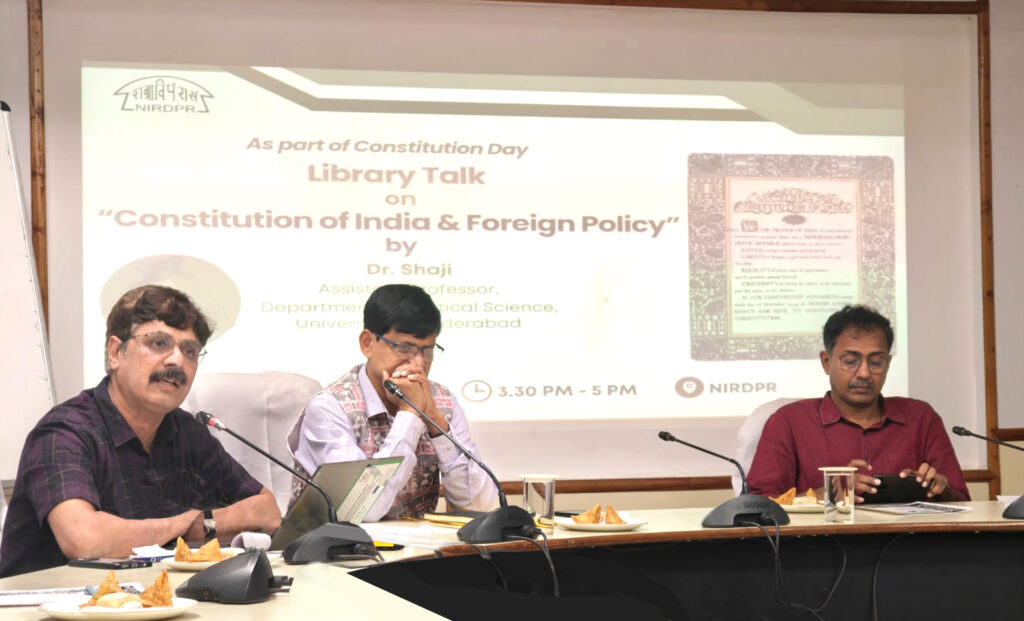
Dr. S. Shaji began his lecture by highlighting Article 51 of the Indian Constitution, which outlines India’s approach to foreign policy. He said that, as far as India was concerned, foreign policy existed during the British regime, and it was drawn up with the intention of serving their interests.
Positioned within the Directive Principles of State Policy, Article 51 is unique globally for its explicit focus on promoting international peace and harmony. Dr Shaji emphasized that Article 51 demonstrates India’s unwavering commitment to fostering global peace, security, and cooperation. It obligates the State to actively advance these ideals by maintaining just and honourable relations between nations, respecting international law and treaty obligations, and resolving disputes through arbitration. These provisions reflect a broader aspiration to create a harmonious and just international order, underscoring India’s dedication to peaceful and cooperative global relations.
In the Q&A session that followed, Dr Shaji responded to questions from staff and students regarding developments in Bangladesh, job scenarios in Canada, the tax rates on dividends in Switzerland, etc.
The event ended with a vote of thanks proposed by Dr Jyothis Sathyapalan, Prof. & Head, CDC. The Library team headed by Dr Umesha M.L., Assistant Librarian, coordinated the programme.
Training Programme on Leadership Skills for Rural Development Professionals
The Centre for Human Resource Development, NIRDPR, conducted a training programme titled ‘Leadership Skills for Rural Development Professionals’ from 16th – 18th December 2024. Dr Lakhan Singh, Assistant Professor, Centre for Human Resource Development, coordinated the programme attended by 28 senior officials from 10 states across the country.
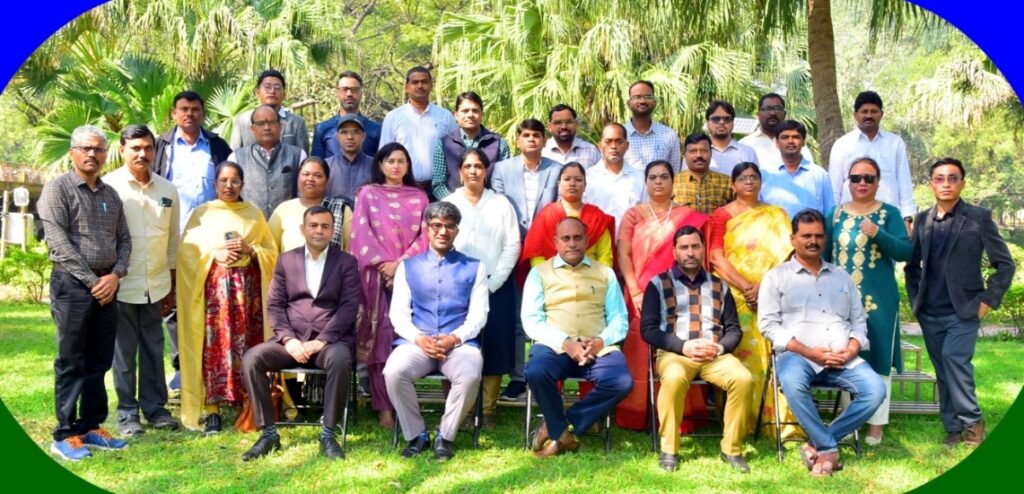

Dr G. Narendra Kumar, IAS, Director General, NIRDPR, inaugurated this programme. During his inaugural speech, he highlighted the importance of skills to become a good leader. He narrated the characteristics of Sri Rama in Ramayan and how he built the team with Vanaras through his leadership qualities to achieve the goal. Without looking at it from the religious point of view, he took the example of the Bhagavad Gita in Maha Bharat by describing the qualities of Lord Sri Krishna in persuading Arjuna to prepare him to fight in Kurukshetra by losing confidence in winning the battle. In addition, he quoted many examples of great and reputed leaders by explaining the leadership qualities and characteristics needed to face tough situations. He advised the participating officers to imbibe and act according to the situation. Also, he talked in length about the current situation of rural development and what leadership qualities the officers require to transform rural development.

Many eminent subject matter specialists delivered and interacted with them and made practical demonstrations and group exercises for better understanding and improving the participants’ leadership skills. The topics delivered include Aspirational Blocks Programme: Aspire to Inspire, Importance of Leadership in emerging rural development scenario, Conflict Management, Communication Skills, Stress Management, Team Building, Motivational Techniques, Decision Making, Block Development Strategies under ADB, select best practices and success stories of good leadership in rural development, etc.
In addition, the participating officers also took brief written tests about leadership issues to ascertain their existing knowledge and skills. They were taught an essential topic, stress management, and exposed to some management techniques/exercises to reduce stress on the job.

As part of the programme, participants were divided into groups and asked to analyse the block development strategies of some select blocks under the Aspirational Blocks Programme and prepare strategies that can accelerate the existing process to achieve the indicators/parameters set under the Aspirational Blocks Programme followed by a presentation by each group. This exercise helped them understand the importance of ABP and its strategies and identified the areas that needed focus. They were also asked to prepare an individual action plan based on what they had learned from the programme.
The participants expressed high levels of satisfaction with the programme, praising its execution and the topics covered by the experts. The programme achieved an overall effectiveness of 82 per cent. More than 93 per cent opined that the programme helped them improve knowledge, skills, and change in attitude.
Capacity Building Programme on Skill Development for KVIC Officials
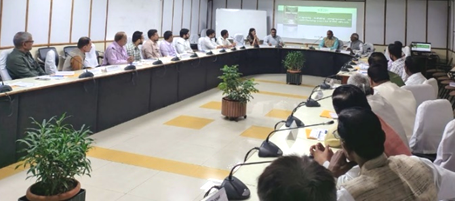
As per KVIC’s requirement, NIRDPR conducted a capacity-building program on skill development for officials and faculty of the Khadi and Village Industries Commission (KVIC) nationwide. Held in two batches from 25th –29th November 2024 and 2nd – 6th December 2024, the programme aimed to enhance participants’ skills in mobilisation strategies, training needs assessment methodologies, and skill development while providing an opportunity to reflect on their training initiatives. Designed under the guidance of Director General Dr G. Narendra Kumar, IAS, and coordinated by Dr Sandhya Gopakumaran, Director, DDU-GKY Cell, and Mr Mohammad Khan, Senior Consultant, Rural Technology Park, the programme included topics such as mobilisation aspects and challenges, the skill development ecosystem, Qualification Packs (QPs) and National Occupational Standards (NOS), entrepreneurship, self-employment, branding and marketing of Khadi products, Panchayati Raj Institutions, and the Aspirational Blocks Programme.

As a part of the training programme, Exposure visits were arranged to T-Hub, T-Works, Rural Technology Park (RTP), and Rural Self-Employment Training Institutes (RESTI) for practical exposure to entrepreneurial and development initiatives.

Expert sessions were delivered by NIRDPR faculty and resource persons, including Dr Partha Pratim Sahu, Dr C. Kathiresan, Dr C. Dheeraja, Dr Akanksha Shukla, Shri P. Kaushik Babu, Shri Shakti Sagar Katre, Dr Nidhi Rawat, Shri R.R. Singh, Dr Jyoti Prakash Mohanty, Shri M. Kumar Swamy, Dr Sandhya Gopakumaran, and Mr Mohammad Khan. The KVIC officials enthusiastically participated in group exercises to discuss challenges faced by their units, performed SWOT analyses, and shared actionable solutions to address these challenges effectively.
The programme concluded with participants presenting their learning and proposed strategies, empowering them to enhance organisational efficiency and contribute to the growth of the Khadi and Village Industries sector.
NRLM CASE STUDY SERIES:
Naari Xurakhya Kokh (NXK): An Initiative by Assam SRLM towards Gender Sensitive Society
Ms Sangita Roy Barthakur
Mission Manager, IBCB
NRLM-RC, NERC-NIRDPR
Introduction
Gender integration is an integral part of the national strategy of DAY-NRLM for addressing social evils like gender-based violence. Specifically, violence against women and girl children, and the ultimate aim is to promote gender equality in all spheres. NRLM focuses on building institutions that support women in gaining:

- Identity: Positive self-image and dignity;
- Solidarity: Voice, Decision-making, and feeling of not alone;
- Capacity: Knowledge, Skills, Resources, and Ownership;
- Access: Rights, Entitlements, and Services;
- Well-being: Livelihoods and Lives; and therefore
- Enhanced freedom and portfolio of choices
Thus, through various training and capacity-building initiatives, the SHG members are capacitated to collectively address socio-economic issues, gain financial independence, and participate in the community decision-making process.
As a part of this initiative, Assam SRLM initiated a separate cell called ‘Naari Xurakhya Kokh (NXK)’ – a dedicated women cell at the Cluster Level Federation (CLF) level.
Background
The population of Assam is 3.17 crore, of which 1.53 crore are female. There is a general concept that women in Assam are more liberal; they are free from the various social constraints and social evils like— supercilious, social taboos, dowry, gender-based violence, etc., compared to other states of the country. The predominance of the tribal society or a long-standing influence of tribal life patterns, where the economy revolves around women’s labour, is the primary influence for which the mobility of women in Assam and in the North East, in general, is considered far higher than it is in the other parts of the country. However, women with poor economic status suffer a lot. Even tribal and minority women are comparatively more excluded or deprived in terms of social status than non-tribal women. On the other hand, women with a better economic position have a louder voice against all types of social discrimination or exclusion than women belonging to poor economic conditions. However, this does not mean that women in Assam are on an equal footing with men.
Assam has been reported as one of the highest crime-rated states in cases of crimes against women for the last three consecutive years, for which official data are available (https://ncrb.gov.in). The rate of total crime against women in Assam was 168.3 in 2021, which was far higher than the national rate of 64.5. The rate was 143.3 in 2017, 166 in 2018, 177 in 2019, and 154.3 in 2020. There has been a marked increase in three categories of crimes against women–domestic violence, kidnapping, and molestation–from 2016 to 2019, according to National Crime Records Bureau (NCRB) data. The trend of increasing crimes against women in Assam is also noted in gender-based violence data collated in the National Family Health Survey-5 (NFHS) 2019-20, released in December 2020. Over 30 per cent of women in Assam reported spousal violence in NFHS-5, up from 24.5 per cent in NFHS-4 (2015-16), and 8 per cent of young women reported sexual violence, up from 5.8 per cent in NFHS-4. Assam’s rate of crimes against women is higher than the Indian average–in 2019, Assam’s crime rate (per 100,000 female population) was nearly thrice the Indian average. Assam police, however, attribute the increase in crimes to higher reporting due to increased women empowerment in the state.
ASRLM started its journey with the women SHG members in 2018, where gender sensitisation training was initiated with SHGs, VOs, and CLFs. A series of training and workshops were conducted on gender sensitisation and mainstreaming. The NRLM Resource Cell of NIRDPR-NERC also supported the SRLM in this endeavour by organising ToTs and supporting the training by deputing NRPs as per demands. All the community cadres were trained on gender and other aspects.
Slowly, the SHGs started discussions around Dasasutras, apart from the Panchasutra, realising various women’s issues such as health & nutrition, rights & entitlements, education, etc, which have a direct impact on women’s lives and need to be addressed at various levels. One such initiative is the Naari Xurakhya Kokh (NXK). These community-led institutions are now becoming the epitome of change and forging collaboration with various stakeholders to address various gender-related issues.
Naari Xurakhya Kokh (NXK) – constitutions and functions
It is a dedicated and special women cell structured at the CLF level, which is a composite body of EC (Executive Committee) members of CLF, Gender Point Persons (GPPs) of the CLFs (One per CLF), members of CLF, PRI members, ASHA, AWW, local teacher, police personnel, lawyer and social worker. It has been envisioned that this cell will look after all the matters related to gender and resolve those. It will enable networking with other departments so that the SHG members can solve the issues they face as individuals or as a collective and attain justice on the issues. It can also be termed a convergence forum where unanimous decisions can be taken mainly on issues related to women, children, and older adults. The constitution of this body has been done in line with the Gender Forum of National Rural Livelihoods Mission.
The Naari Xurakha Kokh (NXK) will build awareness and address various issues related to the following.
A. Gender-related issues
B. FNHW (Food, Nutrition, Health & WASH) related issues
C. Rights and Entitlement related issues
D. Disaster Management related issues.
Regarding gender-related topics and social inclusion, the Cell will perform the following functions.
- The Women Cell will convene, chair, and raise all gender-related topics covered under ASRLM.
- The members of the Cell (President, Secretary, GPP, and Two members) will initiate an agenda-based discussion related to women, children, and older adults in the meeting of the CLF.
- Convene a meeting once a month.
- Prioritise gender topics to be discussed and issues to be addressed.
- Facilitate discussion on action points needed and to be taken up by each member.

6. Ensure that all understand the action points.
7. Record the discussions held, resolutions taken, actions taken, and results achieved in the minutes’ book properly and systematically.
8. Continuous follow-up of cases and maintenance of details in the registers.
9. Intervene in issues if any woman (SHG woman or otherwise) reports a case related to any violence, violation of rights, discrimination, or exploitation-related issues.
10. Register the case in the Women’s Cell and support the woman in resolving the problem.
11. In the case of serious concern, refer the case to the nearest police station.
12. Ensure that the victim receives counselling with the help of GPP and the Cell or experts in the field.
13. Listen to the women/poor who are subjected to violence or exploitation, look at the issue through a gender lens, and take necessary action.
14. Emphasis on the importance of the complementary role of the members.
15. Approach the One Stop Centre of the WCD Department, helpline 181, other helplines, counselling centres, Line Departments concerned, etc., for necessary remedies and convergence to ensure that the women and poor can access their rights and entitlements.
16. Facilitate training of the GPPs of the VOs and SHGs with the help of BPM and BCs of the clusters.
17. Awareness generation of the SHG members regarding gender-related issues.

18. The Women’s Cell will take up complaints and cases every Wednesday at the CLF office at any point decided by the Cell. In case of urgent cases, Cell will have to take up cases anytime (day & night).
19. Organising the ‘National Campaign on Gender’ for a month with the set agenda and preparing a ‘Gender Plan’ for the year.
20. Ensuring implementation of the Gender Plan.
21. Ensuring collection and utilisation of the Gender Fund in a systematic manner.
22. Ensuring proper livelihood opportunities for the elderly SHGs, PWD SHGs, destitute SHGs, and other special SHGs.
The Impact
As part of the establishment of NXK, the Cluster Level Federations are raising a self-contributory fund to address various gender issues on their own. To date, 670 CLFs have collected Rs.2.45 crore during the current FY 24-25 and kept in the NXK account to address different issues related to NXKs and the Gender Resource Centre.
The NXKs across the state have successfully identified and worked on 448 cases, which can be categorised into eight categories.

The NRLM Resource Cell, through its training and capacity building programme, supported Assam SRLM in building awareness about the gender issues and challenges in village situations and also impart enhance understanding of gender mainstreaming and integration into NRLM, specifically to the block-level officials, including the Block Project Managers. These training sessions included the concept and establishment of NXK and its functions, where the highly qualified and experienced NRP extended hand-holding support to the SRLM.
Stories from the field

Child Sexual Exploitation: On 12th September 2024, Naari Xurakha Kokh (NXK) of Agnigarh CLF, Dhekiajuli, under Sonitpur district, took up the case of a 15-year-old adopted girl child, who was allegedly raped by her father for the last three months. The case was registered with NXK, and it, along with the CLFs, formally reported the case to the police and demanded the arrest of the absconding culprit. Since no active actions were taken, the community members took to the streets demanding justice for the girl child. A copy of the memorandum was submitted to the Deputy Commissioner, Superintendent of Police, and Child Protection Officer. Besides, the members reached out to the media houses. The case was also forwarded to the Additional Director General of Police, Assam Police, and State Core Committee Member from the State Level, and the culprit was arrested eventually.

Protest against Rape: As a part of supporting the demand for justice against the rape incident held in R.G. Kar Medical College and Hospital, Kolkata, and gang rape at Nagaon district, Assam, various rallies and protests were organised by the NXK/GRCs/CLFs demanding justice for the victims. The community members organised candle marches, mourning sessions, and submission of a memorandum during the stage protests.
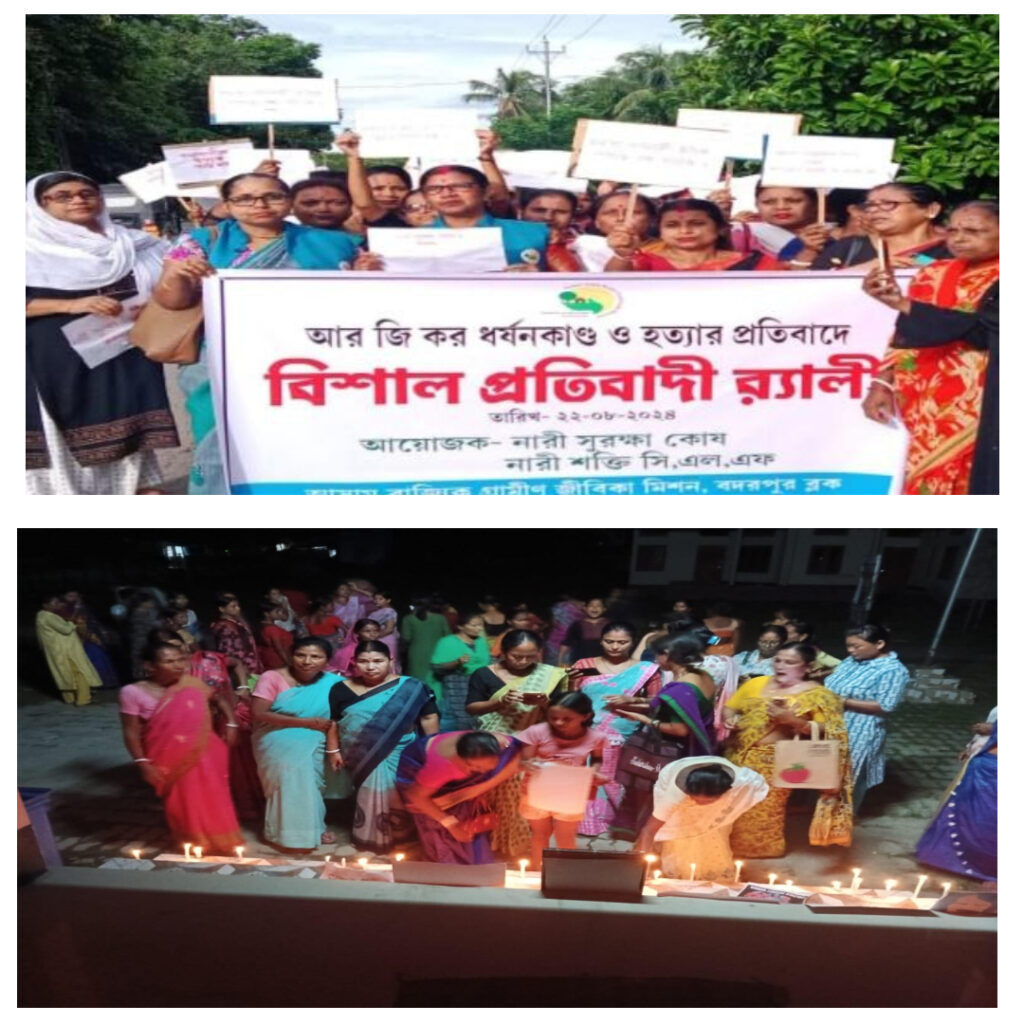
A step towards Combating Child Marriage: The CLF leaders and NXKs have launched another initiative to address the issues of child marriage. As a part of this initiative, which is a state as well as national agenda, the NXKs will take up measures to raise awareness about the ill effects of child marriage by organising street plays and child marriage prevention campaigns through the NXKs and Gender Resource Centre (GRCs), which is a gender forum at the block level, implementing measures to re-enrol children in school or enhance their skills by addressing early school dropout causes, promoting the celebration of girl childbirth (called as ‘Ejupi Gos’, i.e, gifting saplings) initiative, informing families about child-friendly schemes, etc. Forty lakh SHG women support this initiative.
Conclusion
The ‘Naari Xurakhya Kokh (NXK)’ at the cluster level can have a transformative impact on communities by addressing issues related to women’s safety, empowerment, and rights in the long run. This is also expected to empower women, foster a safer environment, and establish social and economic development at the village and cluster levels. It is envisaged to help build a community where women can live with dignity, contribute to society, and thrive without fear of discrimination or violence.
Photo Gallery
Training Programme on Strengthening Primary Healthcare with a Focus on LSDG Theme 2: Healthy Village
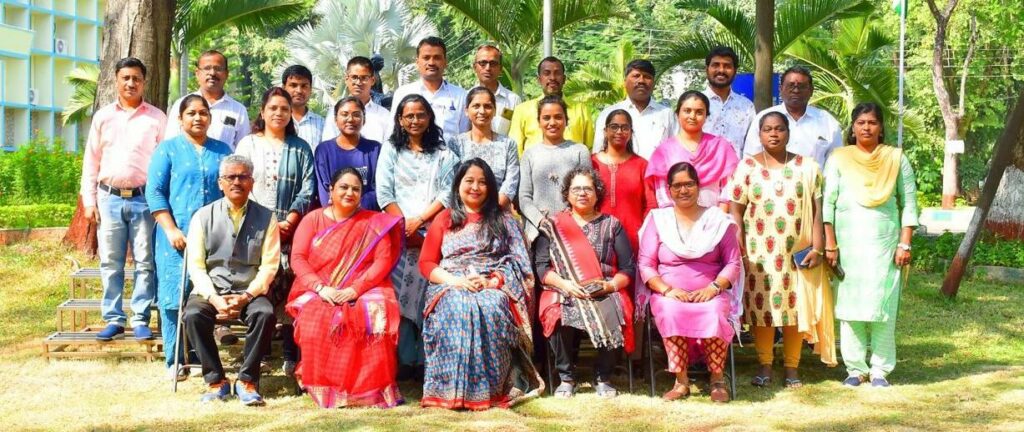
The Centre for PG Studies and Distance Education (CPGSDE) at NIRDPR organised a national training programme on ‘Strengthening Primary Healthcare with a Focus on LSDG Theme 2: Healthy Village’ from 18th to 20th December 2024 on its Hyderabad campus. The programme witnessed the participation of public health and RD&PR department officials, state and district-level master trainers, NIRDPR young fellows, and NGO representatives. The training aimed to equip participants with practical knowledge and tools to strengthen primary health care systems and integrate healthy village targets into local governance.
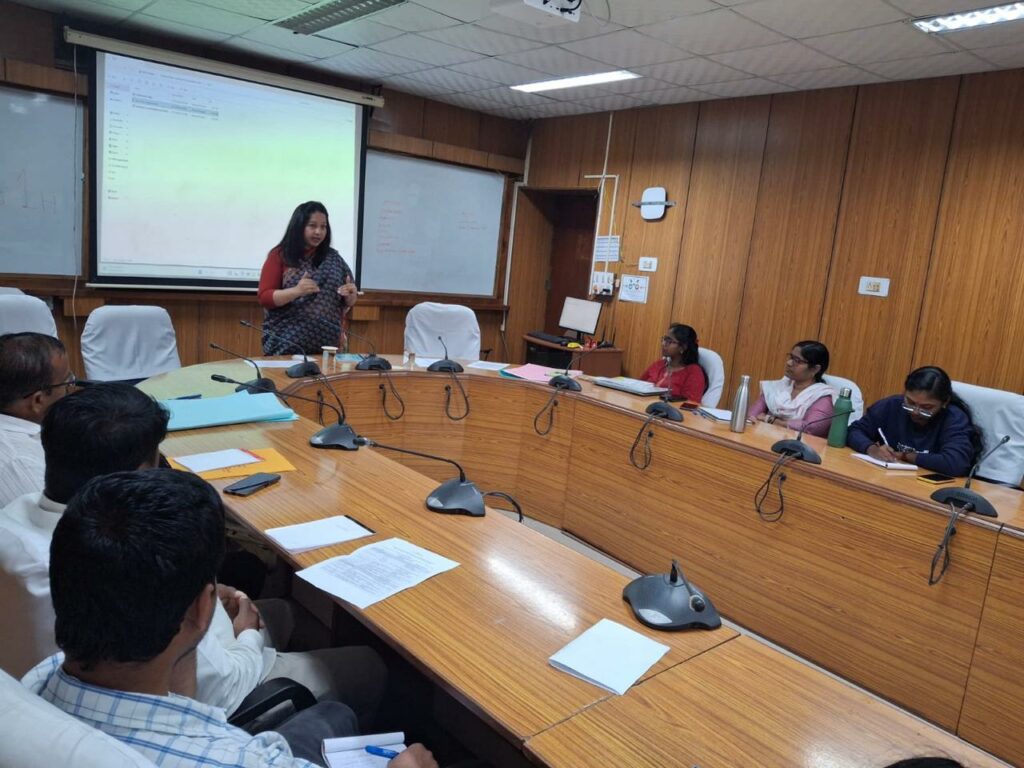
The sessions featured eminent domain experts who covered various aspects of the theme Healthy Panchayat and Healthy Village over the 3 days. Course Director Dr Sucharita Pujari, Assistant Professor, CPGS&DE, welcomed the participants, setting the context by outlining the objectives and providing an overview of LSDG Theme 2 targets and indicators. She emphasised the crucial role of local governance in fostering healthy communities.
The sessions commenced with an introduction to GPDP and integrating Healthy Village targets into panchayat-level planning. Dr Anusha Pilli, Senior Consultant at the Centre for Panchayati Raj, NIRDPR, shared insights on the current status across states and the pivotal role of panchayats. Shri Dilip Pal, Senior Consultant at CPRDP&SSD, NIRDPR, elaborated on the GPDP planning process and the role of panchayats in strengthening the health system.
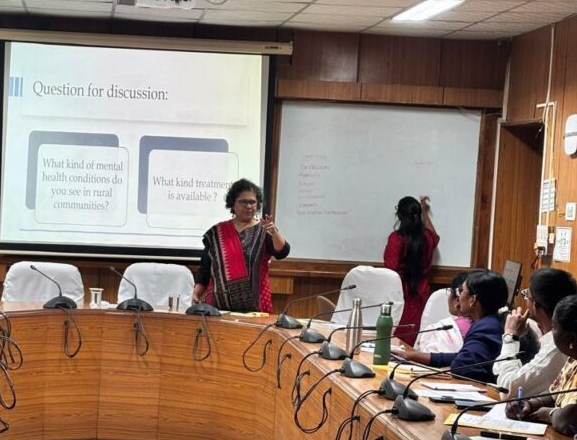
Key focus areas included community-centric primary healthcare, emphasising NCD prevention, mental health challenges in rural communities, and improving maternal and child health outcomes through behaviour change strategies. Participants explored gender-based barriers in accessing healthcare through case studies, enabling them to understand the nuances of gender dynamics in rural settings. Social determinants of health, such as safe energy, water, housing, and the unique health challenges faced by Indigenous communities, were also extensively discussed.
The training adopted a participatory approach, encouraging participants to develop health micro-plans based on hypothetical scenarios for model villages. These plans reflected their learnings and highlighted practical strategies for improving community health outcomes. The importance of social accountability tools in monitoring maternal and child health outcomes and enhancing community participation was also emphasised.
Faculty from NIRDPR and experts from the Indian Institute of Public Health, Hyderabad, served as resource persons, contributing to the programme’s depth and impact. Participants expressed positive feedback, citing the training as insightful and action-oriented.
Dr Sucharita Pujari, Assistant Professor, CPGS&DE, NIRDPR, coordinated the programme.
Empowering Rural India: Three-Day Training on Mahatma Gandhi NREGS
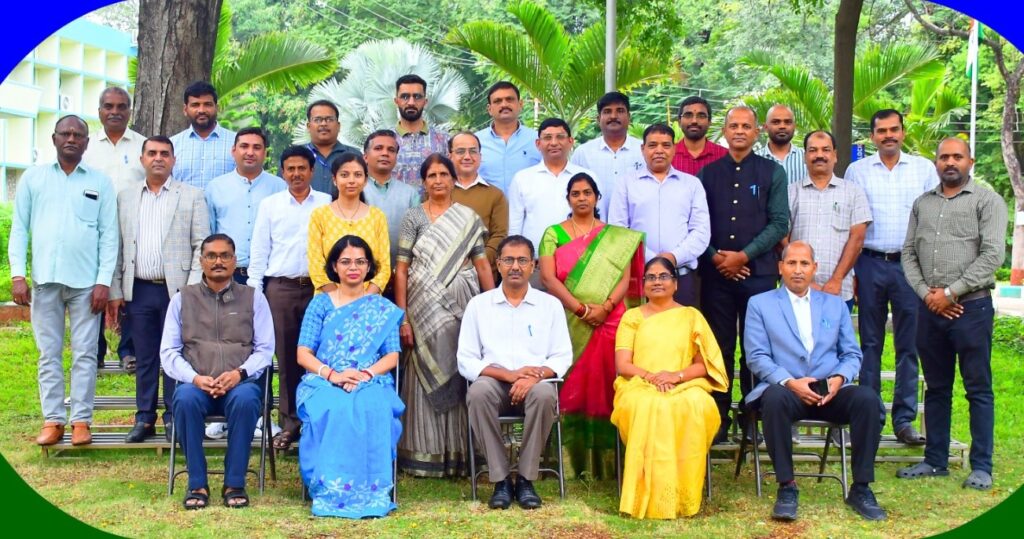
The Centre for Wage Employment and Livelihoods organised a three-day training programme titled ‘Mahatma Gandhi NREGS for Inclusive Development’ from 2nd to 4th December 2024. The programme brought together participants from 11 states.
The training programme aimed at sensitising the participants by enhancing their understanding of Mahatma Gandhi NREGS towards including vulnerable groups and imparting a basic understanding of vulnerable groups working under Mahatma Gandhi NREGS, and focusing on benefits given to the various vulnerable groups regarding assets and employment under Mahatma Gandhi NREGS.
Dr C. Dheeraja, Associate Professor & Head of the Centre for Wage Employment and Livelihoods, inaugurated the training programme by welcoming participants and outlining the objectives. Recognising the importance of tailoring the training to the participant’s specific needs and knowledge levels, a pre-quiz was administered before the commencement of the technical sessions. This assessment helped to identify areas where participants might require additional support or more in-depth instruction.
Dr Sonal Mobar Roy, Assistant Professor, CWEL, delivered a session on ‘Poverty and Vulnerability: Mitigation through Inclusiveness,’ highlighting the key concepts of poverty and vulnerability, multi-dimensional poverty, and India’s vulnerability profile. This session also covered the inclusive nature of the Mahatma Gandhi NREG Act. In the following session, Dr Roy further elaborated on the spirit of inclusivity in the context of Mahatma Gandhi NREGS. This session presented an overview of the Act, which included various aspects, rights and entitlements, beneficiaries and stakeholders, different social groups under the Act, and the like.
Dr Digambar Abaji Chimankar, Associate Professor, CWEL, presented Project Unnati, an initiative under the Mahatma Gandhi NREGS. Designed to enhance the skills of Mahatma Gandhi NREGS workers, Project Unnati aims to empower them with valuable skills, thereby improving their livelihoods and reducing their dependence on the scheme. In the fourth technical session, Dr Anuradha Palla, Assistant Professor, CWEL, conducted an interactive session on permissible works under Mahatma Gandhi NREGS.
On the second day of the training programme, Dr Sonal Mobar Roy delivered a session that covered the topic ‘Gender Sensitization and Mahatma Gandhi NREGS.’ During this session, Dr. Roy highlighted the gender-sensitive features of the Act. In her next session, she discussed the performance of the vulnerable groups and how the Act has laid a roadmap for their inclusivity. The scheme’s performance was analysed with the help of quantitative and qualitative data. Participants also shared different achievements and difficulties faced during the implementation process in different states.
This was followed by a session by Dr Digambar Abaji Chimankar, who discussed the ‘Preparation of Labour budget under Mahatma Gandhi NREGS.’ In this session, the process of preparing the labour budget and the role of GPDP were elaborately discussed.
Dr. P. P. Sahu, Associate Professor, CEDFI, NIRDPR, led the first session on the third day, focusing on ‘Promoting Entrepreneurship towards Inclusive Development.’ The session highlighted that creating awareness of livelihood and entrepreneurial opportunities in rural areas is the need of the hour, and providing consistent and long-term marketing, technical, and financial support is crucial for sustainable entrepreneurship development.
Dr Digambar Abaji Chimankar conducted the next session on ‘Localisation of SDGs under Mahatma Gandhi NREGS.’ The need to localise SDGs was discussed and linked with various rural development schemes, including Mahatma Gandhi NREGS.
All participants were further divided into groups and asked to come up with solutions to the hypothetical problems of gram panchayats as witnessed in the real world. All groups came up with unique solutions and enthusiastically presented them through role-play. This also helped make a strong connection among the participants from different states. A post-quiz test was conducted, followed by feedback from the trainees and certificate distribution.
Dr Sonal Mobar Roy, Assistant Professor, and Dr Digambar A. Chimankar, Associate Professor, CWEL, coordinated the training programme.
Desh ka Prakriti Parikshan Abhiyan: NIRDPR Organises Lecture on Hack for Healthy Living
Desh ka Prakriti Parikshan Abhiyan, led by the Ministry of Ayush, focuses on identifying an individual’s unique mind-body constitution or Prakriti, based on Ayurvedic principles. This knowledge empowers participants to adapt their lifestyles, diets, and exercise routines for better health and disease prevention.
Marking this occasion, the National Institute of Rural Development and Panchayati Raj (NIRDPR), Hyderabad, organised a guest lecture on Ayurveda and Traditional Healthcare system with the tagline ‘Hack for Healthy Living’ on 20th December 2024.
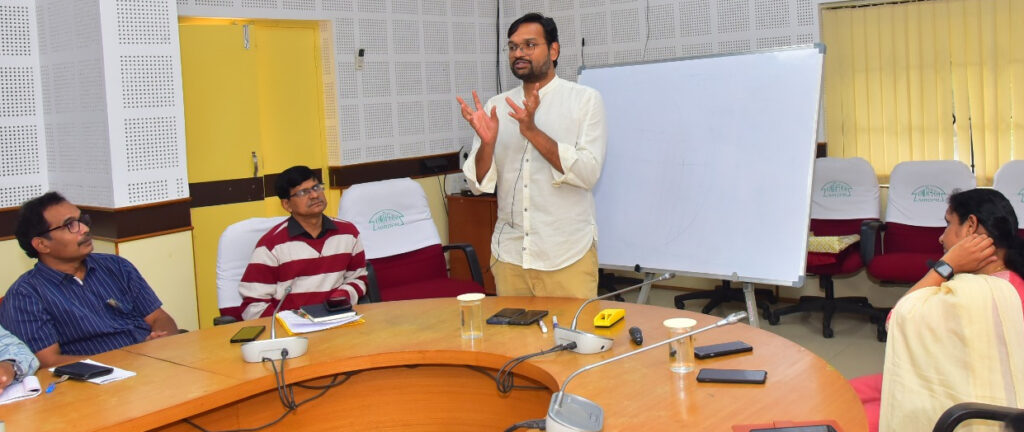
Dr Pranab Kumar Ghosh, Assistant Registrar (T), introduced the Guest Speaker, Dr Sai Krishna of Sri Sri Holistic Hospital, Hyderabad and gave an overview of Desh ka Prakriti Parikshan Abhiyan.
Dr Sai Krishna, a practitioner of Ayurvedic Nadi Vaidya, explained the concept of Prakriti, which refers to an individual’s unique body constitution based on three primary energies: Vata, Pitta, and Kapha. He elaborated on the interconnectedness of mental and physical health, stressing that an imbalance in one’s Prakriti can lead to various health issues. He encouraged the attendees to gain a deeper understanding of their body constitution to maintain a healthier lifestyle.
Further, Dr Sai Krishna introduced the Prakriti Parikshan app, a mobile application designed to help individuals assess their body constitution and connect with qualified Ayurvedic practitioners for personalised guidance.
Dr Sai Krishna urged attendees to promote Prakriti assessments at their workplaces, suggesting that such initiatives could foster a more health-conscious environment. He emphasised the importance of incorporating Ayurvedic wisdom into daily routines to improve overall well-being. Attendees were encouraged to download the Prakriti Parikshan app and engage with Ayurvedic practitioners to make informed decisions about their health.
Academic and non-academic staff and participants of training programmes attended the lecture.
NIRDPR Conducts Training on e-Office for Staff for Enhanced Efficiency
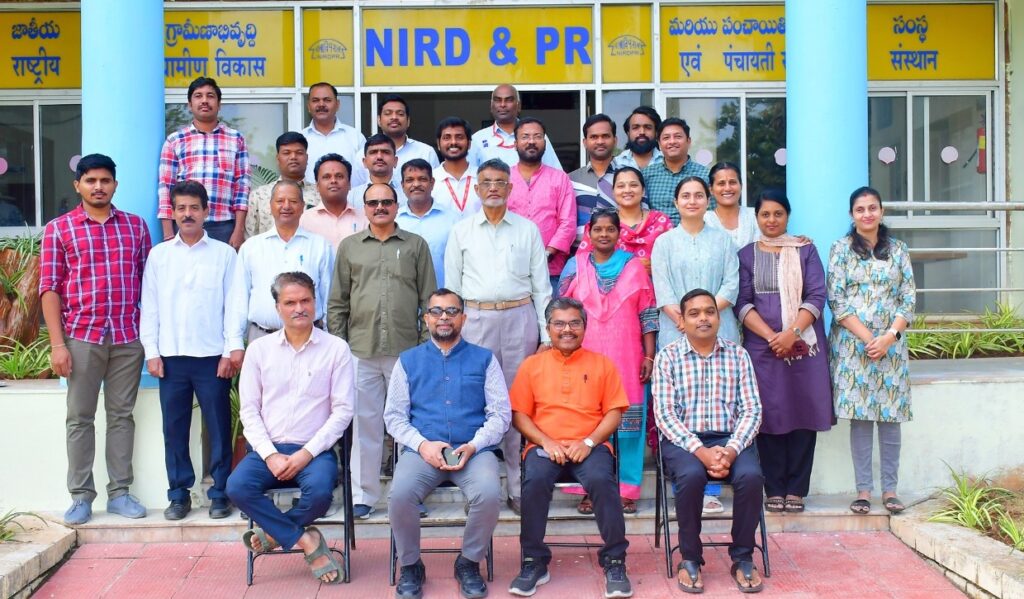
The Centre for Information Communication and Technology (CICT) at the National Institute of Rural Development and Panchayati Raj (NIRDPR), Hyderabad, conducted a one-day training programme on the e-Office platform on 11th December 2024, exclusively for the staff of the Institute.
The programme saw the active participation of 24 staff members representing various centres of NIRDPR. It aimed to empower participants with the skills to utilise the e-office system effectively, promoting seamless digital documentation, enhanced communication, and greater transparency in administrative processes. Through interactive sessions, participants gained hands-on experience in efficient document management and explored strategies to enhance productivity using digital tools, fostering a paperless work culture.
Mahaparinirvan Diwas 2024 Observed at NIRDPR
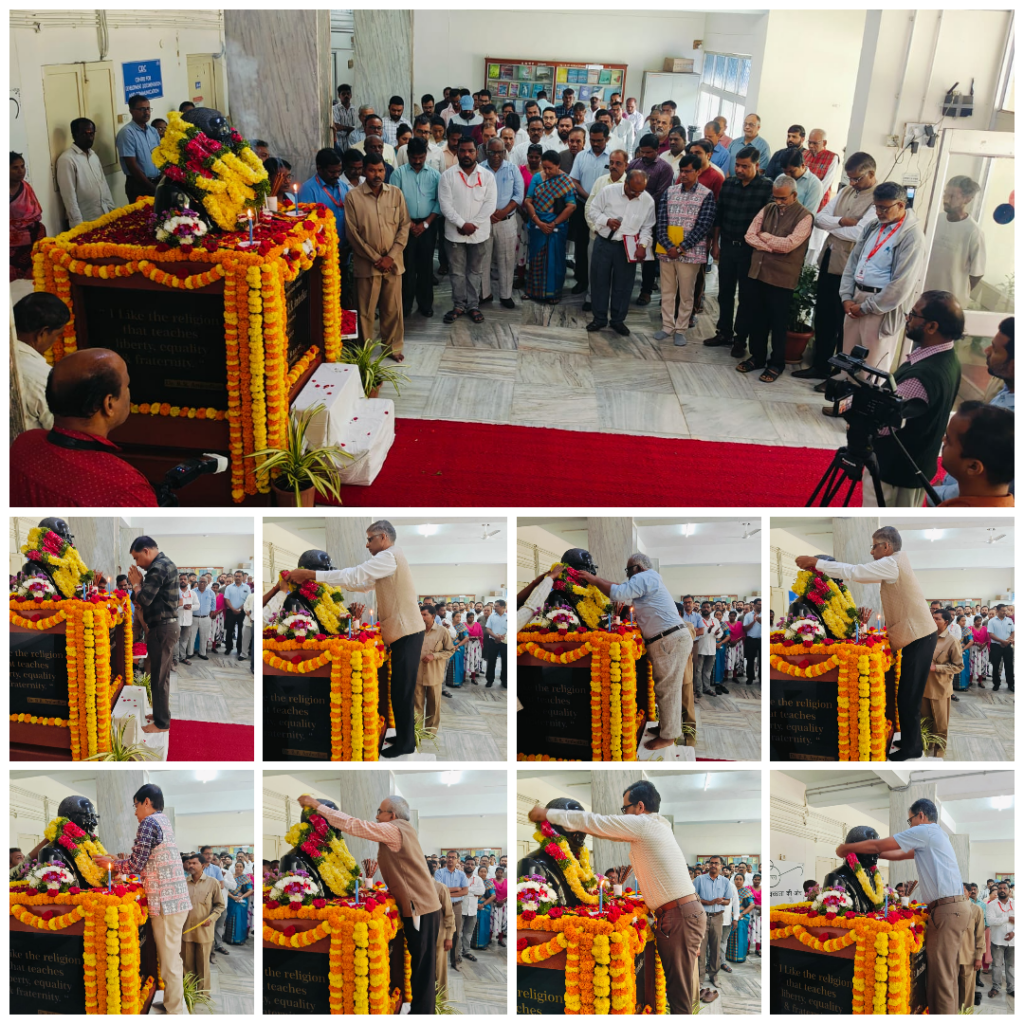
The National Institute of Rural Development & Panchayati Raj (NIRDPR) marked Mahaparinirvan Diwas on 6th December 2024, commemorating the 69th death anniversary of Babasaheb Dr. B.R. Ambedkar.
Faculty and staff paid their respects by offering floral tributes at the bust of Dr Ambedkar in the Dr B.R. Ambedkar Block, reaffirming their commitment to his vision of an inclusive society.
Dr Jyothis Sathyapalan, Professor & Head, CDC; Dr Ravindra S. Gavali, Professor & Head, CNRM, CC&DM; Shri A.S. Chakravarthy, Director (Finance); Dr S. Raghu, Assistant Director, Administration (Section-I); and Dr Pranab Kumar Ghosh, Assistant Registrar (E) & (T), led the proceedings, along with other NIRDPR staff.
Library Talks Focusing on Healthy Soil and Climate Resilience Marks World Soil Day Observance at NIRDPR
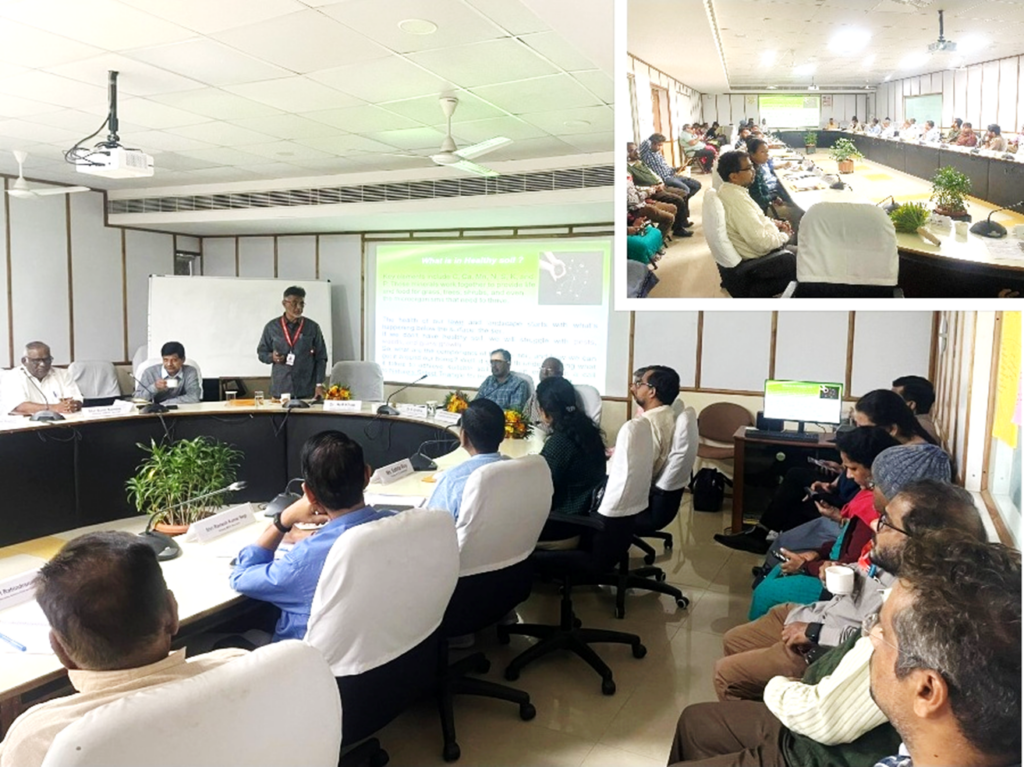
The National Institute of Rural Development and Panchayati Raj (NIRDPR), Hyderabad, observed World Soil Day on 4th December 2024 with a Library Talk on the theme ‘Healthy Soil for Sustainable Agriculture and Climate Resilience.’ The programme featured an insightful lecture by Prof. M. A. Aariff Khan, Garden Consultant, NIRDPR, and was chaired by Dr. M. D. Khan, Senior Consultant, CIAT & SJ., Prof. Jyothis Sathyapalan, Professor and Head (CDC) presided over the event.
During his talk, Prof. Aariff Khan emphasised the critical role of soil health in achieving global food security and combating climate challenges. He elaborated on the components of healthy soil, including minerals, organic matter, water, oxygen, and microorganisms. He discussed sustainable agricultural practices such as crop rotation with pulses, aquaponics, agroforestry, and the integrated use of organic and chemical fertilizers. Prof. Khan also highlighted Hyderabad’s pioneering efforts in forming a Biochar Society to promote sustainable soil management.
The discussion extended to climate resilience, where Prof. Khan addressed the historical development of the concept and its importance in mitigating the adverse effects of climate change. He discussed key strategies, including adopting green energy, reducing CO2 emissions, and limiting global warming. He also stressed the need to build resilience to protect ecosystems, biodiversity, and livelihoods, especially in the face of rising global temperatures.
The interactive session inspired participants to adopt sustainable practices to improve soil health and climate resilience. The event served as a reminder of soil’s pivotal role as the foundation of life and a call to action for its preservation.
NIRDPR Faculty Wins Best Research Paper Award at IMRC 2024

Dr Sonal Mobar Roy, Assistant Professor at NIRDPR (National Institute of Rural Development & Panchayati Raj), Hyderabad, won the Best Research Paper Award at the India Management Research Conference (IMRC) 2024, held in IIM Ahmedabad from 7th– 9th December 2024.
Dr Sonal Mobar Roy’s paper, titled ‘Socio-cultural Dimensions of Healthcare Access: Addressing Heterogeneity amongst Tribal Communities’, was awarded the best in Track 02: Management in Health Services. Her research emphasises the need to understand socio-cultural factors in improving healthcare access for tribal communities.
IMRC 2024 was the first of its kind, bringing together over 500 participants from academia and industry and serving as a valuable platform for sharing innovative research.
The National Institute of Rural Development and Panchayati Raj (NIRDPR), an autonomous organisation under the Union Ministry of Rural Development, is a premier national centre of excellence in rural development and Panchayati Raj. Recognised internationally as one of the UN-ESCAP Centres of Excellence, it builds capacities of rural development functionaries, elected representatives of PRIs, bankers, NGOs and other stakeholders through inter-related activities of training, research and consultancy. The Institute is located in the historic city of Hyderabad in Telangana state. The NIRDPR celebrated its Golden Jubilee Year of establishment in 2008. In addition to the main campus in Hyderabad, this Institute has a North-Eastern Regional Centre at Guwahati, Assam, a branch at New Delhi and a Career Guidance Centre at Vaishali, Bihar.

